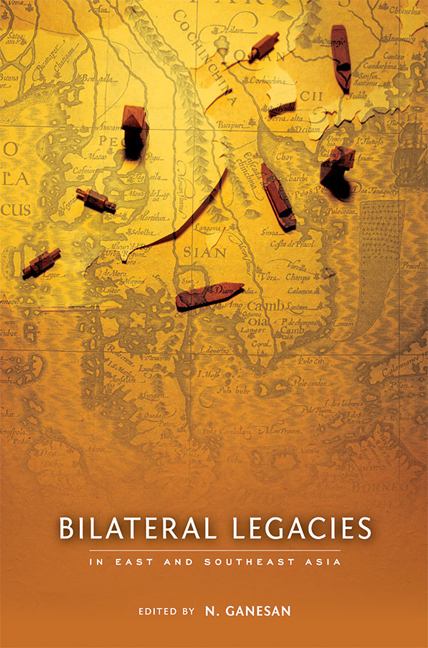Book contents
- Frontmatter
- Contents
- Acknowledgements
- About the Contributors
- 1 Historical Legacies in East and Southeast Asian International Relations
- 2 Historical Overhang or Legacy is What States Make of It: The Role of Realism and Morality in Korea–Japan Relations
- 3 The History Conundrum in Japan's Relations with China
- 4 China–Vietnam Bilateral Overhang or Legacy
- 5 Legacy or Overhang: Historical Memory in Myanmar–Thai Relations
- 6 Glorifying the Inglorious Past: Historical Overhangs or Legacies in Thai–Cambodian Relations
- 7 Comparing Bilateral Overhangs or Legacies in East Asia
- Bibliography
- Index
7 - Comparing Bilateral Overhangs or Legacies in East Asia
Published online by Cambridge University Press: 19 May 2017
- Frontmatter
- Contents
- Acknowledgements
- About the Contributors
- 1 Historical Legacies in East and Southeast Asian International Relations
- 2 Historical Overhang or Legacy is What States Make of It: The Role of Realism and Morality in Korea–Japan Relations
- 3 The History Conundrum in Japan's Relations with China
- 4 China–Vietnam Bilateral Overhang or Legacy
- 5 Legacy or Overhang: Historical Memory in Myanmar–Thai Relations
- 6 Glorifying the Inglorious Past: Historical Overhangs or Legacies in Thai–Cambodian Relations
- 7 Comparing Bilateral Overhangs or Legacies in East Asia
- Bibliography
- Index
Summary
The five case studies in this book clearly prove the fact that overhangs or legacies are a very real phenomenon in East and Southeast Asian international relations. In this regard it is arguable that history and historical memories have enduring value in foreign policy formulation. And, interestingly enough, many of the case studies point to the fact that important developments deriving from the pre-independence or colonial periods had a formative effect on informing policy output in the post-independence period. It may therefore be hypothesized that historical experiences and grievances in particular have had a continuous impact on elite and mass perceptions. Aspects of such perceptions have been imprinted for posterity. Importantly, it is also abundantly clear that there are specific reference points that have led to the creation of the overhang or legacy, and such critical conjunctures invariably deal with some sense of insult or injustice felt by victimized states. Such states regarded themselves the victims of callous exploitation or conquest and occupation at some point in their history and that memory has been preserved over time. As a result of such preservation there appears to be an ongoing demand to seek some form of apology or conciliatory gesture from the aggressor state. This is certainly the case with regard to the perceptions of both the Koreans and Chinese in relation to the Japanese. In both cases one gets the sense that Japan has been unable or unwilling to placate this feeling, at least as observed by the authors.
The cases that involve Thailand are interesting since they are so dissimilar from the cases involving Japan. The Thai overhangs or legacies with Myanmar and Cambodia appear to suggest that the archetypical Thai national is portrayed in contradistinction to that of those from neighbouring countries. This appears to be the case especially if Thailand had a history of conflicts with the countries and had been dealt severe defeats in the past. There seems to be a need to correct past defeats that are then characterized as injustices that need to be retold differently in order to salvage national pride.
- Type
- Chapter
- Information
- Bilateral Legacies in East and Southeast Asia , pp. 166 - 180Publisher: ISEAS–Yusof Ishak InstitutePrint publication year: 2015



